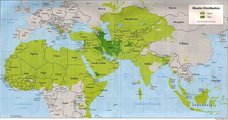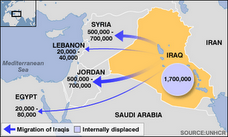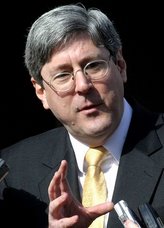 July 12, 2007
July 12, 2007By Bob Woodward, Washington Post Staff Writer
President Bush appeared before the Iraq Study Group Panel in 2006. Bush was joined in the interview by Vice President Cheney, White House Chief of Staff Joshua B. Bolten and Hadley, but they did not speak. "We thought with that whole group there, we were going to get briefings, we were going to get discussions," said Perry. "Instead the president held forth on his views on how important the war was, and how it was tough."
In his meeting with members of the study group, Hayden described a situation in which the Iraqi government either would not or could not control the violence consuming the country and questioned whether it made sense to strengthen its security forces. He depicted the United States as facing mainly bad choices in the future.
"Our leaving Iraq would make the situation worse," Hayden said. "Our staying in Iraq may not make it better. Our current approach without modification will not make it better."
"Our leaving Iraq would make the situation worse," Hayden said. "Our staying in Iraq may not make it better. Our current approach without modification will not make it better."
According to the written record and others in the room, Hayden at one point likened the situation in Iraq to a marathon. He said there comes a point in each race when the runner knows he can complete the challenge. But Hayden said he could see no such point in Iraq's future. "The levers of power are not connected to anything," he said, adding: "We have placed all of our energies in creating the center, and the center cannot accomplish anything."
Numerous U.S. generals already had told the study group that success in Iraq could not come without national reconciliation between the Sunnis and Shiites. Hayden agreed, saying: "The Iraqi identity is muted. The Sunni or Shia identity is foremost." But he clearly saw no end to sectarian killings. "Given the level of uncontrolled violence," Hayden said, "the most we can do is to contain its excesses and preserve the possibility of reconciliation in the future."
He compared the Iraq situation to the prolonged warfare in the Balkans. "In Bosnia, the parties fought themselves to exhaustion," Hayden said, suggesting that the same scenario could play out in Iraq. "They might just have to fight this out to exhaustion."
Hayden catalogued what he saw as the main sources of violence in this order: the insurgency, sectarian strife, criminality, general anarchy and, lastly, al-Qaeda. Though Hayden had listed al-Qaeda as the fifth most pressing threat in Iraq, Bush regularly lists al-Qaeda first.
Members of the study group said Hayden's stark assessment of the Iraqi government dovetailed with what they had heard in September during their visit to Iraq. There, they met with a senior CIA official who held an equally unenthusiastic view. "Maliki was nobody's pick," the CIA official had said, according to written notes from that meeting. "His name came up late. He has no real power base in the country or in parliament. We need not expect much from him."
Given the constant threats and persistent violence, the official had said, it was remarkable that Iraqi government employees showed up for work.
Given the constant threats and persistent violence, the official had said, it was remarkable that Iraqi government employees showed up for work.
"We continue to be amazed that the Iraqis accept such high levels of violence," he told the study group. "Maliki thinks two car bombs a day, 100 dead a day, is okay. It's sustainable and his government is survivable."
....Hayden's frustration with Maliki provides a context to the administration's continuing efforts to pressure the Iraqi leader into finding a political settlement between Sunni and Shiite factions in Iraq. During one week last month, three senior administration officials visited Baghdad to try to speed up the political process.
In her testimony Nov. 13, Rice recounted her discussions with Maliki in which she bluntly told him the importance of making progress on national unity and reconciliation. Rice said she had told the prime minister, "Pretty soon, you'll all be swinging from lampposts if you don't hang together."
Nov. 13, 2006: A Day of Testimony at the White House Officials who met with the Iraq Study Group on that day in the White House Roosevelt Room.
IRAQ STUDY GROUP AT A GLANCETHE ORIGIN: In March 2006, Rep. Frank R. Wolf (R-Va.) asked the U.S. Institute of Peace to coordinate the group, and Congress appropriated funds for its administration.
Related Content
Full Text: Hayden's Prepared Remarks on Iraq and Afghanistan, Nov. 15, 2006, Senate Armed Services Committee Hearing
Full Coverage: The Iraq Study Group
White House Report on Iraq
Initial Benchmark Assessment, July 11, 2007 (pdf)
What bloggers are saying about this article:
Central Sanity
Troubling Information
Petulant Rumblings
Full List of Blogs (80 links) »
Full Text: Hayden's Prepared Remarks on Iraq and Afghanistan, Nov. 15, 2006, Senate Armed Services Committee Hearing
Full Coverage: The Iraq Study Group
White House Report on Iraq
Initial Benchmark Assessment, July 11, 2007 (pdf)
What bloggers are saying about this article:
Central Sanity
Troubling Information
Petulant Rumblings
Full List of Blogs (80 links) »





No comments:
Post a Comment